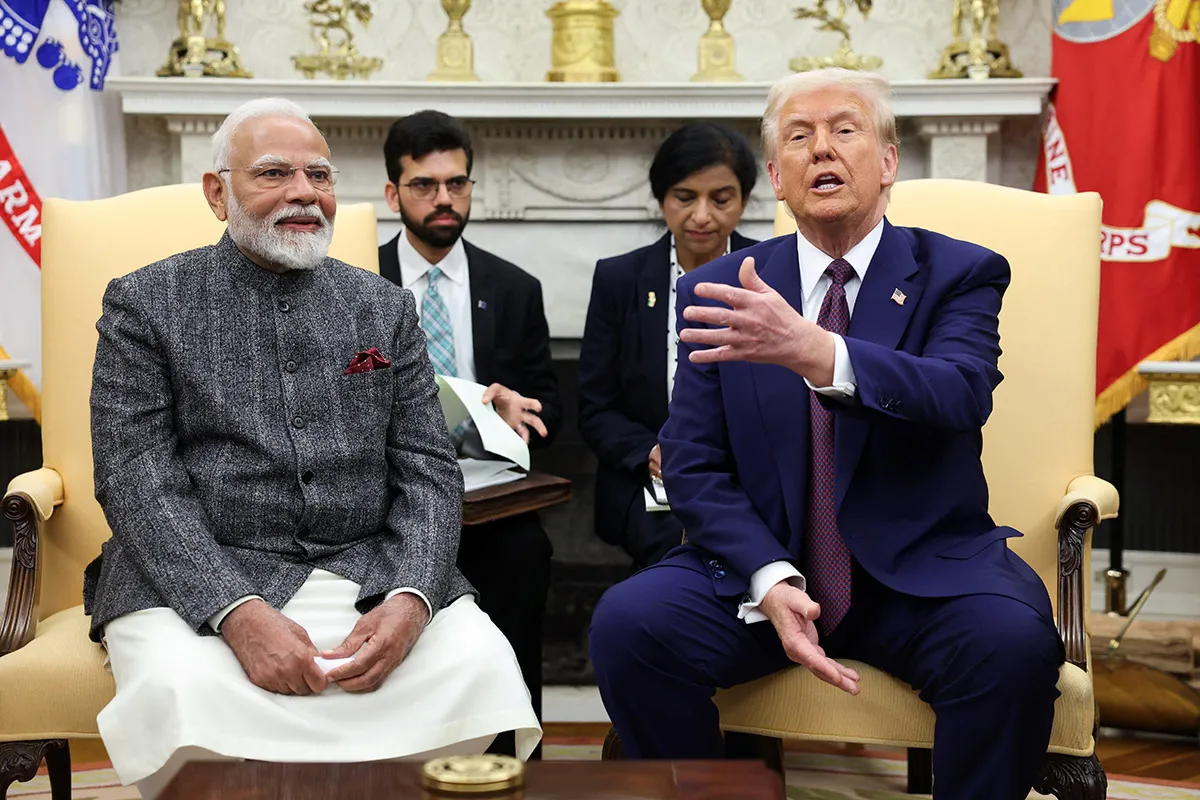India Reasserts Sovereignty Over Kashmir: No Mediation, No Compromise
In a significant diplomatic development, Prime Minister Narendra Modi firmly reiterated India’s unwavering stance on the Kashmir issue during a phone conversation with US President Donald Trump, emphasizing that India does not and will never accept any form of third-party mediation. The statement came amidst persistent international speculation, especially after Trump’s earlier claim that he had played a role in facilitating a ceasefire between India and Pakistan.
Modi’s message was unambiguous — India’s decisions concerning its borders and national security are made independently, and its relations with neighboring countries are managed through bilateral channels, not foreign intercessors.
Context: Ceasefire Between India and Pakistan
The backdrop to this conversation was the brief but intense military escalation between India and Pakistan during May 7-10, marked by heavy artillery exchanges across the Line of Control (LoC). While both nations eventually agreed to halt hostilities, India has now made it clear that the ceasefire was a result of direct military-to-military communication, not brokered by the United States or any other foreign government.
Foreign Secretary Vikram Misri clarified the timeline and nature of events, noting that the decision to stop firing was made bilaterally between the two armies and was executed without any external influence. This is particularly important in the context of Operation Sindoor, a strategic defensive initiative launched by India in response to aggression from across the border.
Operation Sindoor: A Defensive Yet Determined Response
As Modi told Trump during their 35-minute conversation, Operation Sindoor remains active, and India reserves the right to respond proportionately and decisively to any acts of aggression by Pakistan. The Prime Minister emphasized that “India will respond to bullets with bombs”, a statement that underlines the seriousness with which India views its territorial integrity and the safety of its citizens.
Operation Sindoor, while primarily defensive, has showcased India’s capability and willingness to escalate its military posture if provoked. It is a signal to both adversaries and allies that India’s patience should not be mistaken for weakness.
Rejection of Mediation: A Longstanding Policy
The Indian government’s rejection of third-party mediation on the Kashmir issue is not new. This policy dates back to the Simla Agreement of 1972, which clearly states that bilateral issues between India and Pakistan must be resolved bilaterally. Any foreign intervention is therefore not only unwelcome but also a violation of international understandings to which both countries are signatories.
During the call initiated by Trump, which took place after the two leaders failed to meet at the G7 Summit in Canada due to a scheduling conflict, Modi emphasized this policy once again. According to Misri, “India has never accepted mediation, does not accept mediation, and will never accept mediation.” This is a powerful reaffirmation of India’s diplomatic autonomy.
US-India Relations: Strategic But Conditional
While the United States remains an important strategic partner for India, especially in areas such as defense, counter-terrorism, and trade, India has consistently drawn a line when it comes to its sovereignty. Modi made it clear that during the period of military tension, topics like the India-US trade deal or Kashmir mediation were never discussed, directly or indirectly.
The Modi-Trump conversation was initiated at the request of the US President, but India used the opportunity to clarify its position in no uncertain terms. This not only helps prevent misinformation but also ensures that international diplomacy remains anchored in mutual respect and understanding.
Global Implications of India’s Firm Stand
India’s firm stand sends a broader message to the international community — regional conflicts cannot be used as leverage in global diplomacy. The Indian leadership has shown that national interest and security are not negotiable, even when engaging with superpowers like the United States.
This message is particularly relevant in today’s geopolitical climate, where diplomatic narratives can often be shaped or distorted for domestic political gains in other countries. By calling out and correcting misleading claims, India is asserting itself as a confident and responsible global player.
Pakistan’s Role and the Ongoing Threat
The tensions that led to Operation Sindoor were triggered by cross-border violations and provocation from Pakistan, as acknowledged by Indian defense sources. Despite numerous ceasefire agreements, Pakistan has continued to sponsor cross-border terrorism and infiltrate militants into Indian territory, especially in Jammu and Kashmir.
India’s response has been calibrated but forceful. The surgical strikes, Balakot air raids, and now Operation Sindoor have all been part of a larger doctrine of pre-emptive and punitive retaliation. These actions underscore the fact that India is prepared for peace, but not at the cost of compromise or silence in the face of terror.
Media Misreporting and the Need for Clarity
One of the key takeaways from the Modi-Trump call is the importance of accurate media reporting in international relations. Trump’s earlier comments, suggesting he had brokered peace between India and Pakistan, were widely covered and created confusion. India’s timely clarification has now set the record straight.
Going forward, it is vital that international media and policymakers exercise caution while interpreting sensitive geopolitical developments, especially when they involve nuclear-armed neighbors like India and Pakistan.
Conclusion: India’s Message to the World
India has made its position crystal clear:
-
No third-party mediation on Kashmir
-
Unilateral decisions on national security
-
Bilateral dialogues only with mutual consent
-
Firm response to any aggression
This is not just a diplomatic posture but a strategic doctrine that reflects India’s growing global stature and internal cohesion. As the world watches the evolving dynamics of South Asia, India’s leadership continues to champion sovereignty, self-reliance, and security above all else.

